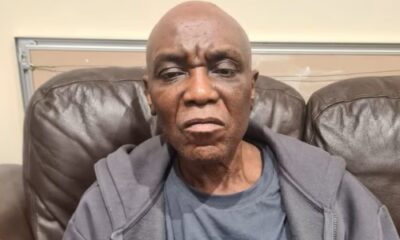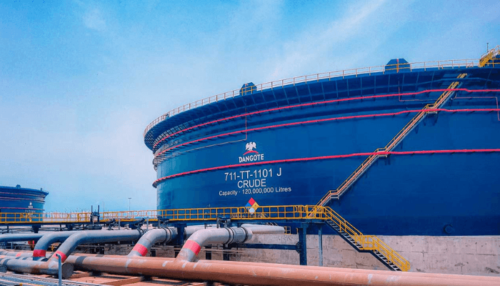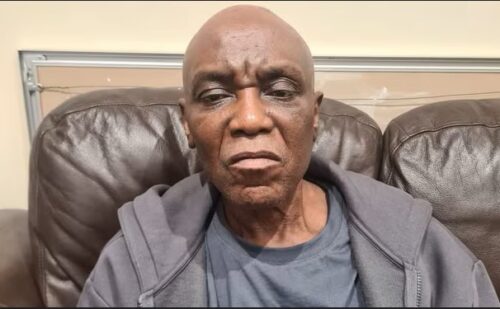The Federal Government may cut its approximately N6.2tn yearly fuel import bill if the Dangote Petroleum Refinery begins the sale of petrol as promised by Aliko Dangote, the Chairman of the Dangote Group.
Speaking on Friday at the Africa CEO Forum Annual Summit in Kigali, Rwanda, Dangote gave Nigerians the assurance that, as per the refinery’s planned operations, the country would no longer require petrol imports beginning the next month.
According to a National Bureau of Statistics study, President Bola Ahmed Tinubu eliminated fuel subsidies on May 29 of last year, resulting in a monthly average reduction of the nation’s gasoline imports to one billion litres.
According to Dangote, the $20bn refinery can meet West Africa’s petrol and diesel needs, as well as the continent’s aviation fuel demand.
He said, “Right now, Nigeria has no cause to import anything apart from gasoline and by sometime in June, within the next four or five weeks, Nigeria shouldn’t import anything like gasoline; not one drop of a litre.
“We have enough gasoline to give to at least the entire West Africa, diesel to give to West Africa and Central Africa. We have enough aviation fuel to give to the entire continent and also export some to Brazil and Mexico.
“We have started producing jet fuel, we are producing diesel, and by next month, we’ll be producing gasoline. What that will do is it will be able to take most African crudes.”
The assurance by Dangote, if realised, would reduce the country’s approximately N6.2tn annual spending on PMS import.
With an average pump price of N670/litre, marketers put the average landing cost of petrol currently at N520/litre, considering the price of the Nigerian National Petroleum Company Limited, which is the only importer of the product.
Operators also put the average difference between the landing cost and pump price of PMS at N150/litre.
With an average monthly consumption of 1 billion litres, Nigeria currently spends approximately N520bn on the importation of PMS every month. This is N6.2tn annually.
Going by the planned June supply of PMS by Dangote, the country is expected to save a substantial amount from the elimination of shipping and other charges attached to importation, according to operators and industry experts.
The difference between the landing cost and the pump price of petrol is N150 per litre, according to operators.
Landing cost is the total cost of delivering the shipment to Nigeria from a foreign country, including all expenses incurred from the point of production to the point of delivery.
Refined petroleum products often arrive in the country via the Atlas Cove, from where it is transferred to jetties via daughter vessels. From jetties, the fuel is moved to various tanks.
Marketers say this difference of N150 between the landing cost and the pump price has to do with the cost of moving PMS from the port to various filling stations across the country. This also includes marine costs, and the Nigerian Ports Authority charges, among others.
The PMS landing cost is different from that of diesel, aviation fuel, and other petroleum products.
In foreign currency, the country spends an average of $4.16bn annually if converted the N6.2tn at the rate of N1,520 per dollar. However, there are arguments that the NNPCL spends more than this on PMS importation.
The actualisation of Dangote’s promise is expected to strengthen the naira.
According to industry reports, Nigeria spends at least $10bn annually on the import of PMS, aviation fuel, diesel and other petroleum products.
Analysts believe that not less than one-third of the country’s annual foreign exchange expenditure goes into fuel imports.
A reliable source at the Central Bank of Nigeria said that the anticipated commencement of fuel supply by the Dangote refinery in June would herald a positive shift in the nation’s economy.
According to the source, the move to halt fuel imports will lead to a substantial reduction in the demand for foreign exchange, thereby strengthening Nigeria’s economic position.
The source further noted that, with the demands on forex reducing, the naira would regain strength.”As the dollar demand reduces, the naira will rebound and that is good for the economy,” the CBN source said.
The NNPCL spokesperson, Olufemi Soneye, declined comments when contacted.
Soneye said the NNPCL is no longer a corporation and could not comment on Dangote refinery’s impact.
The Director of Press and Public Relations, Ministry of Finance, Mr. Mohammed Manga, could not be reached for comments on Sunday as calls and messages sent to him went unanswered.
Also, the Director of Corporate Communications, Central Bank of Nigeria, Hakama Sidi Ali, did not respond to calls to her phone. She had yet to respond to a message sent to her line.
But the Director-General of the Centre for the Promotion of Public Enterprise, Dr Muda Yusuf, said the commencement of refining of petrol by the Dangote refinery would be a game changer for the Nigerian economy, especially from the perspective of the effect on the foreign exchange market and domestic energy cost.
Yusuf noted that, currently about 30 per cent of Nigeria’s import bill is on petroleum products.
“This has been estimated at between $10bn and $15bn annually over the decade. This would amount to a substantial easing of demand pressure on the foreign exchange market,” he stated.
Yusuf added further, “Already we have seen the impact of the domestic refining on diesel and aviation fuel importation. Even the prices have dropped. I therefore expect to see a major impact on the exchange rate.
“However, this positive outlook would depend on how much of the feedstock of crude can be sourced locally by the refinery. If the refinery has to resort to crude oil importation, the optimism about the foreign exchange impact may have to be moderated. Because that would imply some significant forex outflows for crude importation.”
He added that Nigeria is likely to see less importation of petrochemical products and other associated by-products from the refining process.
During an energy conference in Abuja recently, the Minister of State for Petroleum Resources (Oil), Heineken Lokpobiri, opined that Nigeria does not need to import fuel, expressing concerns that the bulk of the country’s foreign exchange goes into fuel importation.
“We must find a solution to our forex problem. Nigeria does not need to import fuel. We should free our scarce forex for other sectors of the economy. I am aware that the bulk of our forex goes to the importation of refined oil products.” Lokpbiri stated, expressing optimism that home-based refineries would put an end to fuel importation.
Meanwhile, fuel marketers said plans had been concluded to meet Dangote for discussions on possible price cuts as his refinery begins the production of PMS next month.
The marketers, under the aegis of the Independent Petroleum Marketers Association of Nigeria, told The PUNCH on Sunday they would meet with Dangote to negotiate a discount through bulk purchases.
Dangote’s 650,000 barrels per day refinery has been trying to secure crude supplies from the United States following the inability of Nigeria to ramp up production.
The refinery, which is the largest in Africa and Europe when it reaches full capacity, has since commenced the sale of diesel and aviation, but its petrol is yet to hit the market.
In April, Dangote crashed the price of diesel from around N1,500 to N1,000 per litre.
But Nigerians are currently eagerly waiting for petrol, which is the major fuel used by transporters, small-scale businesses and individuals for alternative power generation.
The promise of Dangote to end fuel import may be a relief to marketers and Nigerians, who are yet to fully recover from the recent fuel scarcity that nearly brought the economy to a halt in Lagos, Abuja and other parts of the nation.
Speaking in an interview with our correspondent, the National Vice President of the IPMAN, Hammed Fashola, disclosed that the marketers had requested a meeting with the Dangote Group chairman.
According to Fashola, there will be a follow-up to a letter written to Dangote earlier to fast-track a meeting and reach an agreement before the commencement of the sale of PMS.
Fashola had earlier called on the company to consider working directly with the association instead of individuals.
He noted that IPMAN should be a beautiful bride before Dangote for being in control of over 80 per cent of the filling stations in Nigeria.
The IPMAN leader said, “We have our letter with them, we are expecting their response, and we will surely do a follow-up. The letter was sent about a month ago and we are going to follow up. We are just like a ready-made market for Dangote. It is an advantage for him to have us in his programme. I believe that he would like to have us.”
He added that the association would request a discount during the meeting with Dangote.“You know when you come together as a group, you have that negotiating power on your strength. There is no way we will not negotiate for a discount. That is why we don’t encourage individual company participation,” he stated.
Credit: The Punch

 BIG STORY5 days ago
BIG STORY5 days ago
 BIG STORY4 days ago
BIG STORY4 days ago
 BIG STORY5 days ago
BIG STORY5 days ago
 BIG STORY5 days ago
BIG STORY5 days ago
 BIG STORY5 days ago
BIG STORY5 days ago
 BIG STORY4 days ago
BIG STORY4 days ago
 BIG STORY4 days ago
BIG STORY4 days ago
 BIG STORY5 days ago
BIG STORY5 days ago




 vv
vv





























